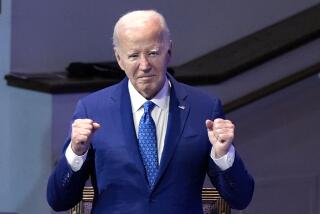Biden meets with Iraqi front-runners
- Share via
Reporting from Baghdad — Vice President Joe Biden met with Iraq’s two front-runners for prime minister on Sunday and expressed unhappiness over the slow pace for forming the next government, according to Iraqi politicians.
Biden, who spent the morning with U.S. forces on the Fourth of July, shuttled between afternoon meetings with Prime Minister Nouri Maliki and secular politician Iyad Allawi, whose Iraqiya coalition won the single largest number of seats in parliament, 91, compared with the Maliki bloc’s 89 in elections nearly four months ago.
Since the national vote, both Iraqi leaders have insisted that they earned the right to head the next government. But in recent weeks, Maliki and Allawi have become serious about holding discussions to resolve the matter, including a meeting last week. The thaw comes after Maliki’s group joined with the parliament’s other main Shiite Islamist-led bloc, the Iraqi National Alliance, for what would be the basis of a ruling majority.
In their own talks, Maliki’s State of Law slate and the Iraqi National Alliance have been unable to agree on who would serve as prime minister. Other parties in the Iraqi National Alliance want to deprive Maliki of a second term in office, according to a member of that coalition. As a result, Maliki started to look seriously at forming a partnership with Allawi instead.
Maliki’s supporters have insisted that their candidate should remain as prime minister because he represents the country’s Shiite majority whereas Allawi, a secular Shiite, is portrayed as a guardian of the Sunni Arabs. The competition appeared to further inflame a sectarian chill in the country’s politics.
But both sides now see virtue in an alliance, although the issue of who would serve as prime minister remains unresolved; the Shiite Islamist ranks of Maliki’s list, and Iraqiya’s secular-minded members, many of whom once belonged to Saddam Hussein’s Baath Party, continue to view each other with suspicion. Both sides express doubt that they will overcome their differences before the next parliamentary session, tentatively scheduled for July 13, which some argue should include the naming of a president and parliamentary speaker.
Maliki spokesman Ali Dabbagh told state television that Biden was worried the next parliamentary session could pass without any decision being made on the shape of the government. It “is a source of worry for them because they don’t want any security vacuum,” Dabbagh said, as the U.S. continues to draw down its troop strength across Iraq.
Mohammed Allawi, a close advisor to Iyad Allawi, said Biden had also conveyed a similar message of concern about the snail’s pace of bargaining. Mohammed Allawi added that Biden encouraged them to strike a deal with Maliki. “They just want to advise and [they think] that it is best for the Iraqi people if those two blocs come together,” he said.
Another Iraqiya official, speaking on condition of anonymity, said he was encouraged by the discussions with Maliki’s State of Law slate and said the Americans had started to play a more hands-on role in the process.
Those on Maliki’s list have also spoken in warm terms about Iraqiya’s fortunes, particularly in light of their list’s own troubles with the Iraqi National Alliance. “According to the atmosphere prevailing now, there are no objections,” said Sheik Haidar Gorani, a member of Maliki’s list. However, Gorani insisted that Maliki should be prime minister.
Biden’s spokesman did not respond to an e-mail request asking for comment on the meetings Sunday. Late Sunday night, an explosion shook the fortified Green Zone in Baghdad, where Biden was believed to be staying.
More to Read
Sign up for Essential California
The most important California stories and recommendations in your inbox every morning.
You may occasionally receive promotional content from the Los Angeles Times.













